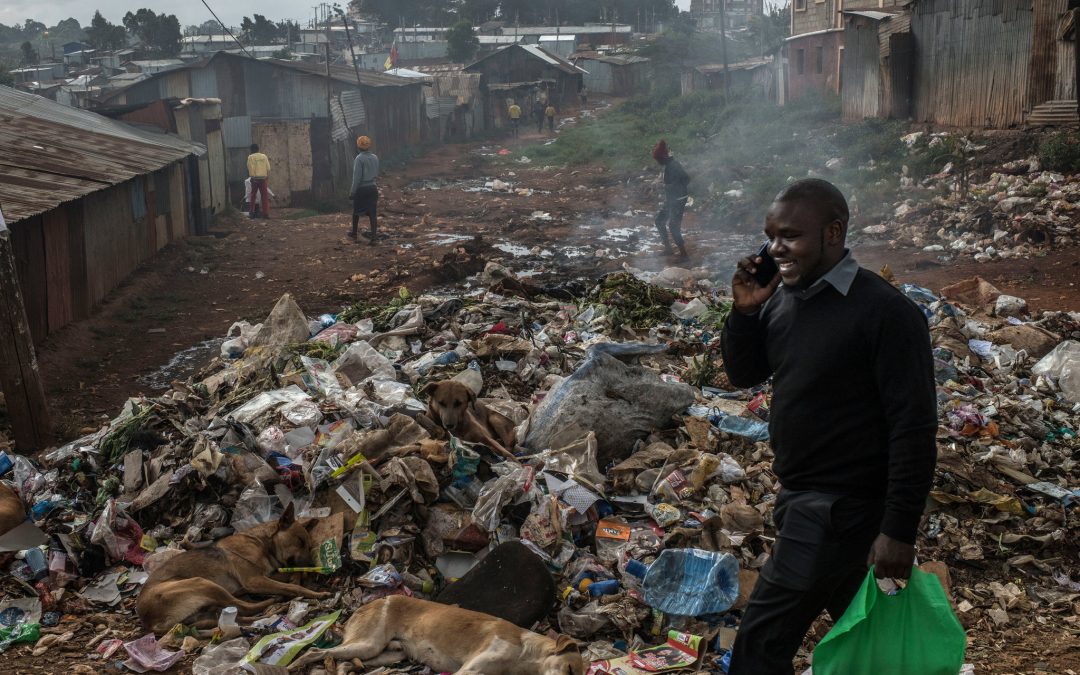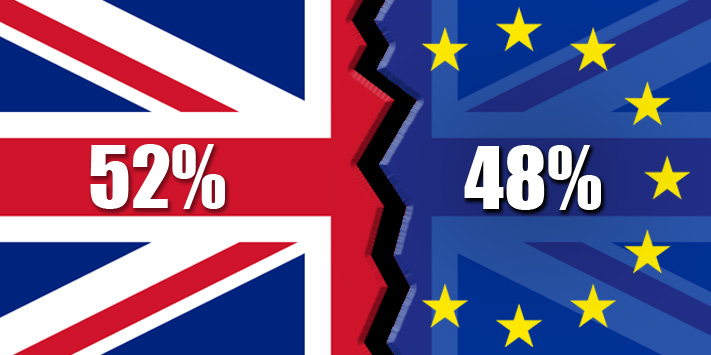
by Michael Bailey | May 5, 2019 | Politics |

Whether you’re already a Buttigieg booster, or, you’re not, or, you’re on the fence, please take the time to read this. It’s excellent perspective, and underscores the importance of doing real comparative study on political candidates before jumping on a bandwagon after digesting short media clips and rehearsed controlled interviews. I’ve heard Buttigieg several times, and find him likeable, but clearly, gauging likeability is not the point of this piece.
By the way, I’m running for President.
MB
A lot of would-be presidents are clever people. Few have a cleverness so well targeted toward liberal intellectuals.
How Pete Buttigieg’s Meaningless Erudition Made Him the ‘Smart’ Candidate
Via NYTimes, by Jay Caspian Kang
April 24, 2019
Late this March, a Norwegian news outlet sprang a surprise question on Pete Buttigieg, the mayor of South Bend, Ind., and candidate for president. The previous week, the writer Anand Giridharadas, who has close to half a million Twitter followers, tweeted that he met Buttigieg and introduced him to a Norwegian friend. “Instantaneously,” he wrote, “Mayor Pete starts talking to her in Norwegian, like a magic trick.” Apparently Buttigieg had read a Norwegian novel in translation and been so taken by it that he learned the language just to finish the author’s untranslated works.
The Norwegian crew wanted to hear it for themselves. In a video that circulated on social media, the reporters smile like proud parents as Buttigieg haltingly says, in Norwegian, “I’ve forgotten so much Norwegian,” followed by a few words about a book and a Norwegian pastor and then an apology, in English: “Sorry, I just ran out of Norwegian.”
The footage, shot by The Washington Post’s Dave Weigel, meets all the demands of social-media authenticity — it was shot on a phone, with the terrible audio, pixelation and skewed perspective that assure you a real human has captured a spontaneous moment. It traveled the same viral routes as Giridharadas’s tweet, acting as evidence that Buttigieg was the cleverest man ever to run for president. It hardly mattered that the main thing Buttigieg seemed able to say in Norwegian was that he had forgotten a lot of Norwegian.
As these stories spread, accompanied by more video evidence, Buttigieg became a case study in what a friend of mine calls “internetty smarts” — intelligence reduced down to a collection of references and images. Like all internetty things, this type of intelligence plays to the viewer’s vanities and prejudices. In this case, it seemed driven by the sorts of people who study literature, read magazines like this one and wring their hands about public-school segregation while quietly sending their kids to elite private schools. Did you know Mayor Pete can speak eight languages? (At least enough, according to his memoir, to order a sandwich.) Did you know he was a Rhodes scholar? Journalists leaned into the image. Ryan Lizza of Esquire asked Buttigieg if running for president was more like “Ulysses” or “Finnegans Wake”; Buttigieg’s answer was mostly incoherent, but to be fair, the question didn’t make much sense either. After watching Buttigieg speak, The New Yorker’s Adam Gopnik gushed: “Damned if he isn’t just as impressive as people say: people-smart and policy-smart and funny and eloquent and can cite Joyce without reaching. … The Harry Potter for our Voldemort? Ah! Hope.”
In his weeks on the national scene, Buttigieg has built a brand squarely aimed at a certain kind of liberal intellectual — the type whose prose-driven, subjective, humanist view of the world has lately fallen out of style, replaced by data analysis and ideology. His unassuming face now seems to be everywhere. The blitz has felt less like a presidential campaign than a liberal-arts variety show — a best-case scenario for what happened to Max Fischer from “Rushmore.” A few weeks after the musician Ben Folds told a story about playing a duet with the candidate, a Buttigieg adviser tweeted a video of Mayor Pete “tickling the ivories” before a talk at Scripps College. Even his choice of song — Spoon’s “The Way We Get By” — fit the brand, nailing a demographic of upper-middle-class dads who wax nostalgic about their college radio shows and the professors who taught them to love James Joyce. As Notre-Dame burned, Buttigieg offered his sympathies in French.
I don’t doubt that Mayor Pete, a Harvard graduate and the son of two professors, is genuinely smart. Nor do I think the excitement about his candidacy has been driven entirely by the polyglot fetishes of my media colleagues. He speaks in a calm, thoughtful manner with a touch of a young Dustin Hoffman’s charm. The candidacy of an openly gay man has genuine symbolic importance. And while he has yet to produce meaningful policy ideas, he has drawn some cultural lines by playing up his Midwestern roots, gently scolding “coastal elites” and the left’s obsession with “identitarianism.”
But “internetty” intelligence, like all memes, turns a human being and a lifetime of experiences into a matching game: You see a photo of a bookshelf, recognize the titles of books you wished you had read and conclude that the man standing in front of them must be smart in the way you want to be smart. This connection is not about politics or electoral outcomes; it lies in a more personal space. Imagining yourself in a book club with Pete Buttigieg becomes this election’s having a beer with George W. Bush. If the news media has an “identitarianism” problem, it’s not so much that people bunker down into racial, gender or sexual groups, but that a whole class of journalists and thinkers never seems to be able to wander out past its own pool of references — all so admiring of the same things that some are blinded to the similar backgrounds of almost every other Democratic candidate for president.
Julián Castro — a former mayor of San Antonio, a city roughly 15 times the population of South Bend — went to Stanford and Harvard Law School. Cory Booker was a Rhodes scholar, too. Amy Klobuchar went to Yale, and Kirsten Gillibrand, another Ivy Leaguer, speaks Mandarin much better than Buttigieg speaks Norwegian. (For all the Buttigieg fans gushing about Harvard, it seems worth pointing out that our current president also attended an Ivy League institution, as did Bush.) But to a certain kind of liberal, none of those bona fides seem to matter quite like a casual reference to “Ulysses” and a few words in an unexpected language. Gillibrand’s Mandarin can be written off as the résumé-building accomplishment of a striver, while Norwegian, which has no practical value for an American president, is taken as a sign of intellectual curiosity and authenticity — the sort of whimsical surplus achievement that often upstages workaday accomplishments.
Elections, of course, aren’t about qualifications. Each of our last two presidents spoke to some furtive aspiration among the electorate, embodying a general style voters were eager to identify with. Buttigieg does this for a narrower audience: With his air of decency and grab bag of gifted-and-talented party tricks, he doesn’t so much represent the will of the Democratic electorate but rather the aspirations of its educated elite, maybe especially those who see a shrinking market for their erudition.
This form of identity politics has its consequences. We are constantly arguing over the workings of American meritocracy, in schools and then colleges and then jobs: How do we get past the old networks of privilege and prejudice and accurately evaluate people’s abilities? Is the answer hard numbers and standardized tests? Or is it some “holistic” view of each person, which scrutinizes their spark and talent the same way a college applicant’s extracurricular activities are evaluated for sincerity? Who gets to make those calls?
My fear is that such a system might look a bit like Buttigieg mania: an insidious game in which entire lives of experience, or even exactly matching credentials, get overshadowed by the dilettantish longing of the upper middle class. The Mayor Pete bubble should serve as a portent of what might happen if we strip away every objective measure of merit, however problematic or biased, in favor of how someone’s idiosyncratic talents make us feel. Consider that the person Giridharadas and others have described as the opposite of Donald Trump isn’t Elizabeth Warren, a self-made public intellectual and policy expert from a more rural and blue-collar background than Buttigieg’s campus roots, but an erudite 37-year-old mayor who seems most intent on dazzling the country with his academic feats of strength.
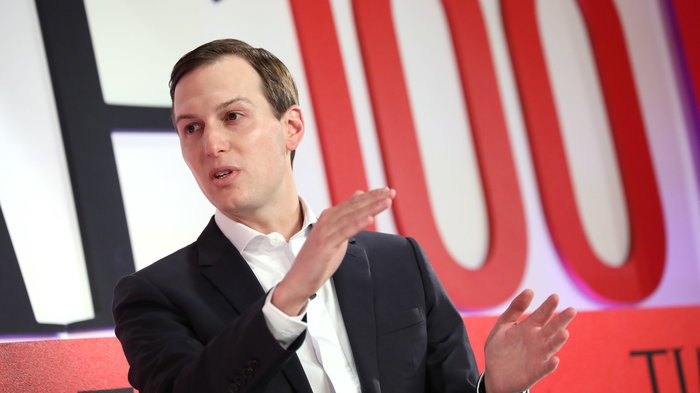
by Michael Bailey | Apr 26, 2019 | Cyber Warfare & State Security, Politics |

Jared Kushner spoke about Russian election interference during the Time 100 Summit 2019 in New York City. Credit: Brian Ach/Getty Images for Time
I’m pretty much done characterizing Donald Trump. There’s long been nothing more to learn about this man that people don’t already know.
Jared Kushner, on the other hand, is a different story. He lays low and has an ounce of measured judgement about when to open his mouth in public. Combine that with his immediate proximity to Trump on all fronts, and the curiosity of his influence, if any, is strong.
To date, Kushner has done nothing to distinguish himself from the tribe. That does not mean he isn’t instrumental behind the scenes, and a meaningful influencer of how our country moves forward, or backward.
At best, he is what he projects-a docile, entitled elite, with little more than a dilettante’s interest in mixing it up with politics or governance. At worst, he is a charade of a diplomat concealing a hard-core, cold blooded capitalist with malleable ethical and legal boundaries, and questionable instincts to anchor thoughtful judgement on complex issues.
Even if he is parts of both, his rare public comments are not encouraging.
FACT CHECK: Russian Interference Went Far Beyond ‘Facebook Ads’ Kushner Described
In a rare public appearance on Tuesday, Jared Kushner, President Trump’s son-in-law and one of his closest advisers, said that the multiple investigations into Russian election interference have been more harmful to American democracy than the original interference itself.
“The whole thing is just a big distraction for the country,” Kushner said at a Time magazine event in New York City. “You look at what Russia did — buying some Facebook ads to try and sow dissent. And it’s a terrible thing, but I think the investigation and all the speculation that’s happened over the past two years has had a much harsher impact on our democracy.”
In describing Russia’s efforts leading up to the 2016 election, Kushner emphasized what he called the relatively small amount of money Russian agents spent advertising on social media.
“They said they spent $160,000. I spent $160,000 on Facebook in three hours during the campaign,” Kushner said. “If you look at the magnitude of what they did and what they accomplished, I think the ensuing investigations have been way more harmful to our country.”
Fact check: Were Facebook ads the extent of Russian election interference?
The short answer: No.
The long answer: The redacted version of Justice Department special counsel Robert Mueller’s report revealed a years-long plot by the Russian government to interfere in the U.S. that investigators called “sweeping and systemic.”
As to the amount of money expended on Facebook ads, the company said Russian operatives did spend less than $200,000 on advertising on the platform — but that doesn’t account for the organic content the operatives created and shared.
Not only were influence specialists within Russia’s Internet Research Agency purchasing normal advertisements, they were authoring their own posts, memes and other content as they posed as American users.
They also reached out to politically active Americans, posing as like-minded supporters, and helped organize rallies and other events in the real world.
Facebook says the Internet Research Agency may have reached as many as 126 million people. Separately, Twitter announced that about 1.4 million people may have been in contact with IRA-controlled accounts.
The social media aspect of the interference was just one dimension. Cyberattackers also went after political victims in the United States — whose emails and other data were released publicly to embarrass them — and state elections officials and other targets. And there may have been other avenues of interference as well.
The origins of the scheme
Russian operatives lied to get into the U.S. as early as 2014 on “intelligence-gathering missions.” They traveled across the country to get the lay of the land before ramping up efforts to try to interfere with American politics.
By September 2016, two months before the U.S. presidential election, the Internet Research Agency was working with an overall monthly budget that reached over $1.25 million. It employed hundreds of employees, a graphics department, a data analysis department, a search-engine optimization department, an IT department and a finance department, according to an indictment filed last year by Mueller’s team.
And it hasn’t stopped.
The U.S. military reportedly blocked the Internet access of the IRA during last year’s midterm elections to keep it from interfering with the midterm election. U.S. Cyber Command also targeted Russian cyber operatives, according to a report by The New York Times, with direct messages letting them know that American intelligence was tracking them.
And in October, a Russian woman was accused, according to a criminal complaint filed in federal court, of conspiring to sow discord and division in the U.S political system.
That conspiracy, the complaint said, “continues to this day.”
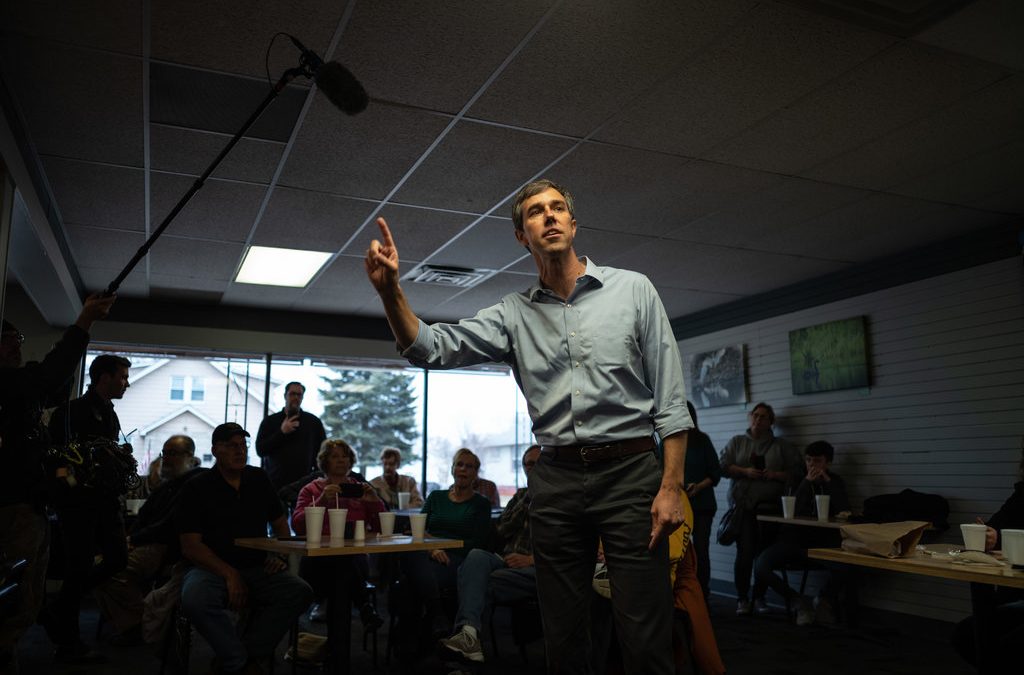
by Michael Bailey | Mar 28, 2019 | Politics |
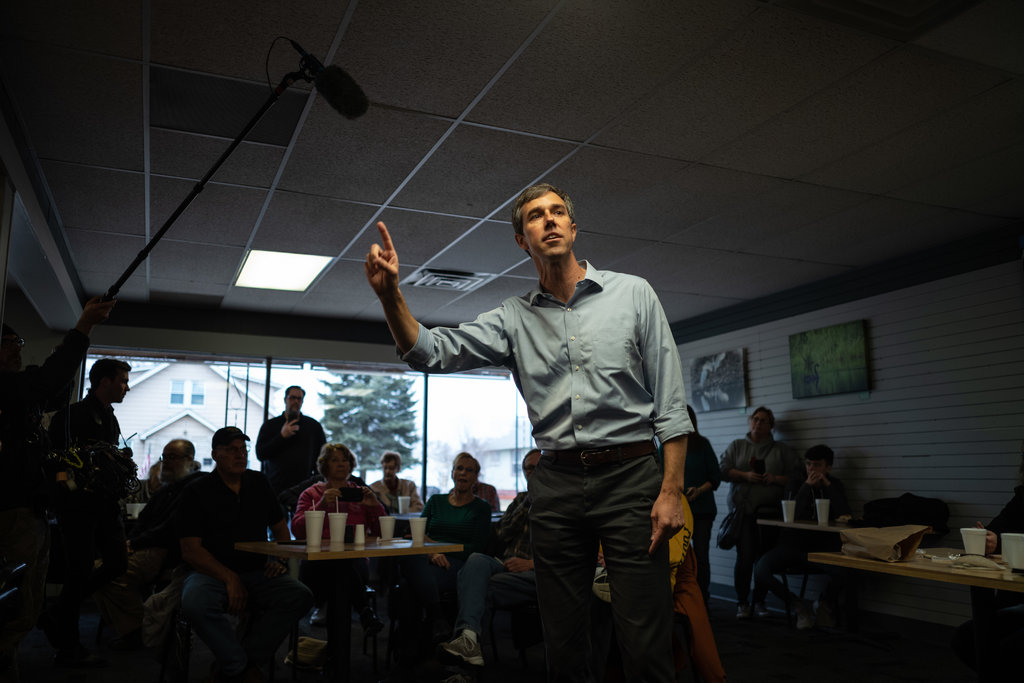
Beto O’Rourke on the opening day of his campaign for president. – Credit: Todd Heisler/The New York Times
A fair portrait of Beto’s current status, and his reception. The piece is long, but I found it useful, and worth digesting to round out his picture.
As for me, I lean Nay on his chances for nomination, let alone beating Drumpf.
Beto strikes me as a Bernie wannabe without the core substance, experience, or speaking skills. Bernie Light, if you will, or Bernie as activist HS senior. Additionally, there’s enough contradiction in his political past, as well as, easily targeted vulnerabilities, that will get him taken down by the Right, if not also, more progressive, and seasoned competitors.
The advent of Beto O’Rourke’s presidential candidacy has Democrats arguing ferociously among themselves.
By Thomas B. Edsall, Via NYTimes/Opinion
Mr. Edsall contributes a weekly column from Washington, D.C. on politics, demographics and inequality.
March 20, 2019
Within days of his announcement that he was running for the Democratic presidential nomination, Beto O’Rourke shot up in the rankings in terms of money, media coverage and Google searches.
Then the knives came out — progressives, women, African-Americans and party loyalists all took a stab at him.
The response to Beto is polarizing the Democratic activist community. The overriding question for Democrats is electability: who can beat Trump is a matter of pressing concern and profound anxiety for at least half the nation. The wrong choice would be disastrous.
Let’s start with O’Rourke’s negatives and we’ll get to the positives later.
“I’ve been quite critical of O’Rourke because I don’t really think the 2020 race needs him. We already have a pretty good bench of Democrats, and they mostly have thought far more about policy and politics than O’Rourke has,” Sean McElwee, a co-founder of Data for Progress, whose views represent those of many on the outspoken left, told me:
I think he’s vulnerable because of his gaffes and vague policies, but I think he’s most weak due to his pretty pro-development tenure on the El Paso City Council.
McElwee contended that O’Rourke is
no more electable than Kamala Harris or Elizabeth Warren and would be far less prepared to staff and run a White House. He’s never shown a commitment to progressive policies in the past, why should we trust him now? We don’t need a superstar, we need someone ready to push all-out to implement the progressive agenda.
Gina Glantz, a co-founder of GenderAvenger, an organization determined to ensure “women are represented in the public dialogue,” replied to my inquiry about O’Rourke:
I must admit after a few days of watching and reading about his opening gatherings I am less rather than more intrigued. To me, he exudes a sense of entitlement, which I find off-putting.
How about O’Rourke and the white working class?
Paul A. Sracic, a political scientist as Youngstown State University, emailed me:
O’Rourke’s vague, “We all need to come together” message will not resonate with people who see life as a battle. Working class voters believe in pugilistic politics. And I suspect that O’Rourke’s punk rock background will seem odd to working class voters. These voters want to feel as if their candidates are “one of them.”
Negative coverage in the press has been abundant:
“The Unbearable Male Privilege of Beto O’Rourke” (The Daily Beast). He voted for Republican legislation (The Wall Street Journal). He put his adolescent fantasies into print (The Resurgent). He’s a wealthy dilettante (The National Review), an empty shell (The New Republic), a teenage hacker (USA Today), a master class in male entitlement (The Guardian).
At the same time, O’Rourke has captured the imagination of millions of voters and donors.
Frank Wilkinson, a former colleague of mine, wrote at Bloomberg:
O’Rourke is not the only candidate modeling decency as an antidote to Trumpism. But he’s the one who has best harnessed the anxiety and rage generated by Trumpism’s assaults on democratic values and transformed them into willful, defiant optimism.
Don Fowler, former chair of the Democratic National Committee, captures this feeling: “He clearly possesses a charismatic charge, a spark that few others have.” Still, Fowler goes on to enumerate O’Rourke’s liabilities:
His impressive campaign for the Senate in Texas was a combination of luck and a damaged opponent. His ability to conduct an effective national campaign is totally unknown. His recent tour of the country was essentially by himself — a very poor way to test a candidate’s national potential in a crowded, competitive field. As to issues, the same unknown quality of his organizational potential characterizes his policy and ideological stances. Both major prongs of a national campaign are truly unknown and must be tested in the public crucible. Only time will tell on both policy and operational scores — wait and see.
A Texas Democratic operative lavished praise on Beto, on background, in order to speak freely:
O’Rourke has an intangible energy that goes beyond the litmus test. On a national scale that could be monumental. It’s emotional. It’s not tangible. Beto tapped into something with nontraditional voters. People who never publicly supported a campaign were putting Beto signs in their yard. LeBron James wore his logo on a hat.
“I first saw the momentum in late spring 2018,” reports the Republican strategist Scott Reed:
I live in Dallas and saw the yard signs popping up, all in front of large homes and mansions that would traditionally have been straight G.O.P. It almost became a badge of courage for many of the limousine liberals in Dallas.
Reed, who ran Bob Dole’s 1996 presidential campaign, went on:
His Willie Nelson event in Austin drew 50k folks and was also a strong signal to young voters — even though very few voted. His performances in the debates was exceptional and added to his momentum. Cruz was the #1 G.O.P. fund-raiser and he got swamped every quarter. I see a little Bobby Kennedy in him.
Richard Murray, a political scientist at the University of Houston, was also impressed. He emailed:
His appeal in Texas is a combination of an attractive persona with animated mannerisms that come across as cool and authentic to many (especially those under 35); boundless energy plus exceptional verbal skills that enable him to weave stories from folks he’s encountered on the campaign trail into compelling narratives (a rare skill) — displayed in an environment where voters in our very diverse and fast growing metropolitan areas have soured on the far right turn of Texas GOP leaders like Ted Cruz and Dan Patrick.
How about a national campaign?
Will this combination work in a national primary featuring the most diverse set of competitors in the nation’s history? I do not know, nor does anyone else. But the retail politics states of Iowa and New Hampshire are great places to test his road show outside the Lone Star State.
Murray’s son, Keir Murray, a Democratic political consultant in Texas, added more praise:
My own sense is his appeal was based, in part, on being a natural foil to Cruz (who is pretty much loathed by all but true conservatives in Texas) and by extension to Trump. O’Rourke is self-effacing, low-key guy, who comes across as fundamentally decent. I don’t think most Democrats, liberals or everyday Texans knew much about his policy positions, or cared much. They liked him. People sensed he was being himself — not perfect, not having all the answers — but honest and good-hearted.
Robert Stein, a political scientist at Rice, is upbeat on O’Rourke’s prospects. He wrote me:
Shortly after the November election progressives hit him hard for not backing their issue positions on guns and energy. My sense is that he is looking to avoid being defined on a left/right dimension/continuum. It seems like he is trying to define his candidacy as humane, pragmatic and capable of beating Trump.
Stein argues that
he is sufficiently retail for places like Iowa and New Hampshire and if he can survive the rush before Super Tuesday, he should come out of the March primaries in the upper echelon of remaining candidates.
Although O’Rourke lost the Texas Senate race to Cruz by just under 3 percent, exit polls show that he won among women, 54-46; among voters under 45, 59-40; minorities, 69-31; college graduates, 51-48; moderates, 65-34; and voters who say they are not white born-again or evangelical Christians, 61-38.
While suffering from some hostile media impressions, O’Rourke has gotten his share, if not more so, of favorable press:
He’s authentic, full of energy, and stripped of consultant-driven sterility (Vanity Fair). Will Beto O’Rourke Become President? (Texas Monthly). Beto O’Rourke Rivals Trump on Social Media (Newsweek). Beto O’Rourke could lead a blue wave in Texas (Vox). Beto O’Rourke blows up the 2020 Democratic primary (Politico).
At the same time, some of the strongest opposition to O’Rourke — reflecting schisms within the Democratic Party — has come from women’s rights advocates, many of whom took offense at a comment he made to Vanity Fair: “Man, I’m just born to be in it.”
Natasha Korecki, a Politico reporter, captured the feminist opposition to O’Rourke in her March 15 story, “‘Not one woman got that kind of coverage’: Beto backlash begins.”
Korecki wrote:
The breathless, sweeps-like cable television coverage that greeted the former Texas congressman’s first campaign events stunned and frustrated many Democratic operatives — particularly women — who viewed it as an example of the double standard at work in the historically diverse presidential field. To them, O’Rourke, a white, male candidate had already been anointed the next sensation, his entry into the race greased by live television shots and O’Rourke-centric panels.
Celinda Lake, a Democratic pollster, told Politico, “I think if you look at the pattern, there is a real distinction between the way men were covered and the way the women were covered. There’s a huge double standard,” before adding:
With women, many, many more negatives were raised and the men were treated like the Second Coming. I’m surprised that this is continuing in 2019, after the year of the woman.
In response to the animosity, O’Rourke indicated that he would pick a woman as his vice-presidential running mate. On March 15, he told reporters: “It would be very difficult not to select a woman with so many extraordinary women who are running right now.”
O’Rourke appears to be acutely sensitive to this issue. He told Vanity Fair, before he announced his bid, that “the government at all levels is overly represented by white men,” and he didn’t leave it there:
That’s part of the problem, and I’m a white man. So if I were to run, I think it’s just so important that those who would comprise my team looked like this country. If I were to run, if I were to win, that my administration looks like this country. It’s the only way I know to meet that challenge.
It’s not altogether clear, however, that women currently seeking the top job would be thrilled by O’Rourke’s offer of the number two spot.
Washington political professionals are also going to be a hard sell.
John Lawrence, former chief of staff for House Speaker Nancy Pelosi, questions whether O’Rourke is up to the challenge. Lawrence says he finds it difficult
to see a white male emerging from the multicandidate pack. True, all the women/minorities could divide up the other voters, but with proportionate allocation of delegates, it’s hard to see a white male moderate emerging with a majority.
“Freshness only goes so far,” Lawrence pointed out:
After a year of being beat up by competitors, the press, Trump, grass roots, etc., he might not look or sound so “fresh.” He strikes me as somewhat superficial, very much a personality; I am not convinced the act sells on a national basis.
Isaac Hale, a political scientist at the University of California, notes that
Beto doesn’t have the luxury of running in the Democratic presidential primary as “not Ted Cruz.” which is certainly a large part of what endeared him to Democratic voters around the country in 2018.
O’Rourke, Hale observes, “is something of a blank slate that voters and party elites can project their own policy preferences onto,” a characteristic that can work to his advantage or disadvantage.
Lynn Vavreck, a political scientist at U.C.L.A., looked at the same issue from a different angle:
The ways these races get framed depends a lot on who the candidates are and what their constraints are — if O’Rourke finds himself in a race against another young white male who is inspiring, these things won’t be a strength of his; but if he finds himself running against an older person who isn’t inspiring, they could be.
Vavreck added:
Your constraints are only constraints if your opponent doesn’t share them; and your strengths are only strengths if your opponent doesn’t share them. When there are 16 people vying for the nomination you have to winnow the field to be able to talk sensibly about who has advantages beyond just fund-raising and organization. Are there no other candidates who have “capacity to inspire,” “policy centrism”?
In the current contest, Vavreck declared, “There are. This makes me think that these may not be unique strengths of this candidate!”
Suzanne Model, a sociologist at the University of Massachusetts-Amherst who has written extensively on race and immigration, argues that O’Rourke faces an uphill battle for the nomination:
O’Rourke will do well in the primaries but it is unlikely that he will win. Young, handsome and self-effacing, his charismatic manner will appeal to “non-policy wonks.” This includes traditionally-oriented women, young adults, and political moderates. In addition, his recent pro-immigrant stance, Hispanic sounding name and Texas roots should garner him support among Latinos.
But, Model continued,
O’Rourke’s problem is that he has little appeal to left-leaning voters or African-Americans. They watched the G.O.P. destroy a Democratic president who expressed a willingness to work with Republicans; hence, they seek a candidate who is more experienced, sophisticated and aggressive.
In order to beat Trump, Model contends,
The Democratic standard-bearer must carry a significant proportion of two constituencies: African Americans and working class white males. Under an O’Rourke candidacy, too many African Americans will stay home and too many working class white males will vote for Trump. Perhaps no Democratic candidate is capable of succeeding simultaneously with these two heterogeneous groups, but that is the most plausible route to a Trump defeat.
Which brings us back to the existential question I raised at the beginning of this column: Can Beto O’Rourke beat Donald Trump?
O’Rourke’s fund-raising success will keep him in the contest longer than less fortunate competitors, and the volume of media coverage he elicits is boosting his name recognition, a crucial first step.
G. Elliott Morris, a political data reporter for the Economist, noted on Twitter that O’Rourke has received more cable news coverage in the five days since his announcement than any other candidate during the full post-announcement week. O’Rourke is on a path to get 180 percent of the coverage received by Bernie Sanders, the previous leader on this measure.
While head-to-head polls are still in a larval stage, they do signal the demographic sources of support for the candidates.
The most recent CNN poll, released on Tuesday, shows, for example, that the leader, Joe Biden, at 28 percent overall, gets more support from moderates than from liberals, more from older voters than young voters, more from men than women and more from whites than from minorities. Bernie Sanders, at 20 percent, is just the opposite, stronger among liberals, young voters, minorities and women.
O’Rourke, at 11 percent, has a long way to go to catch up with either Biden or Sanders. But the CNN poll shows that O’Rourke’s supporters tend to be slightly more liberal than moderate, young rather than old, female rather than male, and O’Rourke gets more support from African-Americans and Hispanics than from whites.
In other words, O’Rourke’s backing is tilted to constituencies that are not normally associated with a moderate white Democratic politician whose voting record, by party standards, is on the center-right.
If these demographic patterns hold, O’Rourke is competing more directly with Sanders (and Kamala Harris and Elizabeth Warren) than with Biden.
The Sanders-O’Rourke battle has already begun. Bernie Sanders loyalists have been challenging O’Rourke’s credentials for the past three months as both men seek support from younger voters.
“Forces loyal to Vermont Senator Bernie Sanders are waging an increasingly public war against Texas Rep. Beto O’Rourke, the new darling of Democratic activists,” Jonathan Allen and Alex Seitz-Wald of NBC News wrote in December. “O’Rourke’s ability to connect with younger and progressive white voters,” they continued, “puts him in direct competition with the Vermont senator.”
On Tuesday, Sanders announced that he has hired David Sirota, one of O’Rourke’s harshest critics, as a senior adviser and speechwriter. On Dec. 22, Sirota published a 1,700 word denunciation of O’Rourke in The Guardian that concluded,
Another blank-slate Democrat who pretends there is a unifying third way between the 99 percent and the 1 percent and who refuses to take sides in big fights against corporate power — that may excite Betomaniacs, establishment Democrats and those with stakes in the status quo, but it won’t rescue our country and it won’t save the planet.
For a candidate with only a modest record in national politics, O’Rourke faces a daunting but not necessarily insuperable challenge in securing the nomination. His candidacy will be a test of his charisma and “spark,” as Don Fowler put it — of the “decency” and “integrity” that a fair number of voters and observers have commented on — against the more substantial and detailed progressivism of his adversaries, the moderation of still others — and all the things we don’t know about him yet.
Thomas B. Edsall has been a contributor to The Times Opinion section since 2011. His column on strategic and demographic trends in American politics appears every Wednesday. He previously covered politics for The Washington Post. @edsall




